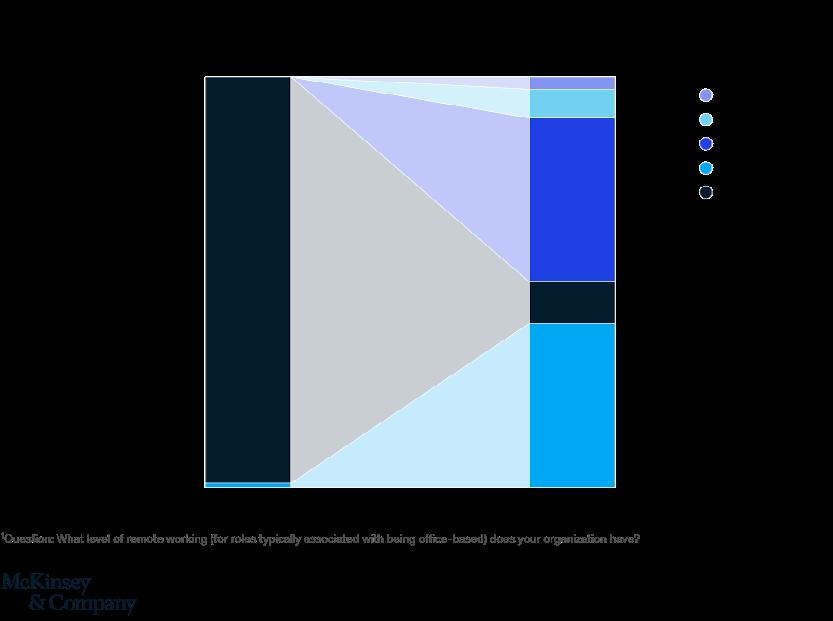
3 minute read
Changes in the Industry due to the Pandemic

AT THE START OF THE PANDEMIC, MANY COMPANIES WOULD HAVE QUICKLY ADJUSTED, GOING IN A “BATTLE” MODE CREATING CRISIS MANAGEMENT GROUPS, IMPLEMENTING PANDEMIC SAFETY PROTOCOLS, QUICKLY ADJUSTING OPERATIONS, AND FORMULATING NEW WORK FROM HOME ARRANGEMENTS.
However, nothing could have prepared the industry for the challenges and harsh reality the impact of this pandemic would bring. Many of the strategies, coping mechanisms and technological developments seen during the past year will now shape the way business and operations are conducted for years to come.
One of the major changes has been a genuine and renewed focus on employee well-being, in particular, mental health. Throughout the industry, companies have taken a deeper look at the stresses and anxieties employees are facing during this pandemic, recognising that these stresses are real and can greatly impact overall company performance. Support mechanisms for mental health are more readily available and are accessible remotely including employee assistance programmes, open discussion forums, relax sessions, homeschooling support materials, and free access to applications.
Companies rose to the challenge by accelerating the digital transformation process. Data is now revealing that the pandemic has fast-forwarded the migration of data and record systems to digital platforms well beyond five years. Remote or work from home arrangements has forced the industry to transform traditional methods of paper-based information and everyday activities into digital means that can be accessed, shared, and collaborated with team members safely from home. The movement of information and files to robust and secured Cloud technology is no longer optional or seen as a luxury item. The creation of virtual workspaces almost overnight has facilitated rapid change in work culture and opened opportunities for new project management techniques. Organisations and project team members at large have realised that they no longer need to take long flights and to meet face to face when the same level of collaboration can be done virtually.
Heritage's Digital Transformation project is a demonstration of this as project team members have been effectively collaborating daily for the past year with the location of team members being scattered across the world. In addition, a range of professional
https://www.mckinsey.com/business-functions/organization/our-insights/whatexecutives-are-saying-about-the-future-of-hybrid-work#

development courses that was once inaccessible through traditional face-to-face classroom settings is now available online.
The pandemic has also fast-tracked the fundamental approach to projects, which are now being managed remotely, slowly moving away from the more traditional waterfall approach to an iterative agile approach. In this way, projects are being developed, reviewed, and delivered in discrete stages where unknowns and uncertainties are willingly received. Soon project terms, common to agile, such as scrum master, user stories, personas, project velocity will be commonly heard.

One would think in-person site visits cannot be compensated by digital technology. However, energy companies have recognised the risk of the potential spread of COVID-19 to operations having noncore personnel in their oil and gas producing sites. Virtual site visits and work assurances are now being conducted remotely relying on digital 3D images supported by software such as HOLOVIEW that allows a full 360 degree of a view site, at multidimensional angles.
Points of interest or on-site faults can be highlighted and quickly shared, including the capability to measure distances along augmented objects. 3D imaging software has economic benefits to companies operating with multiple offshore platforms since the cost associated with helicopter flights and accommodation has been reduced while employees virtually visit sites safely at home. A bonus to this will be the reduction in carbon footprint included in many corporate GHG initiatives.
International companies have taken remote work to another level by transcending regional and country boundaries. It has now been common for employees to be assigned to projects located outside of their resident country. Collocated office teams have been decentralised and virtually spread across the globe. International oil companies benefit from harnessing specific talents of employees since now able to select from team members a wider global pool.
What can we expect post-pandemic as the energy sector and companies at large move into the next normal? A recent survey done by McKinsey and associates shows that most organisations will adopt a hybrid approach and states “nine out of ten organisations will be combining remote and on-site working”. Whether this happens is yet to be seen.
Notwithstanding the challenges, the pandemic has revealed some positives. Many agree that it will be a tragedy not to continue holding on to the silver lining.










